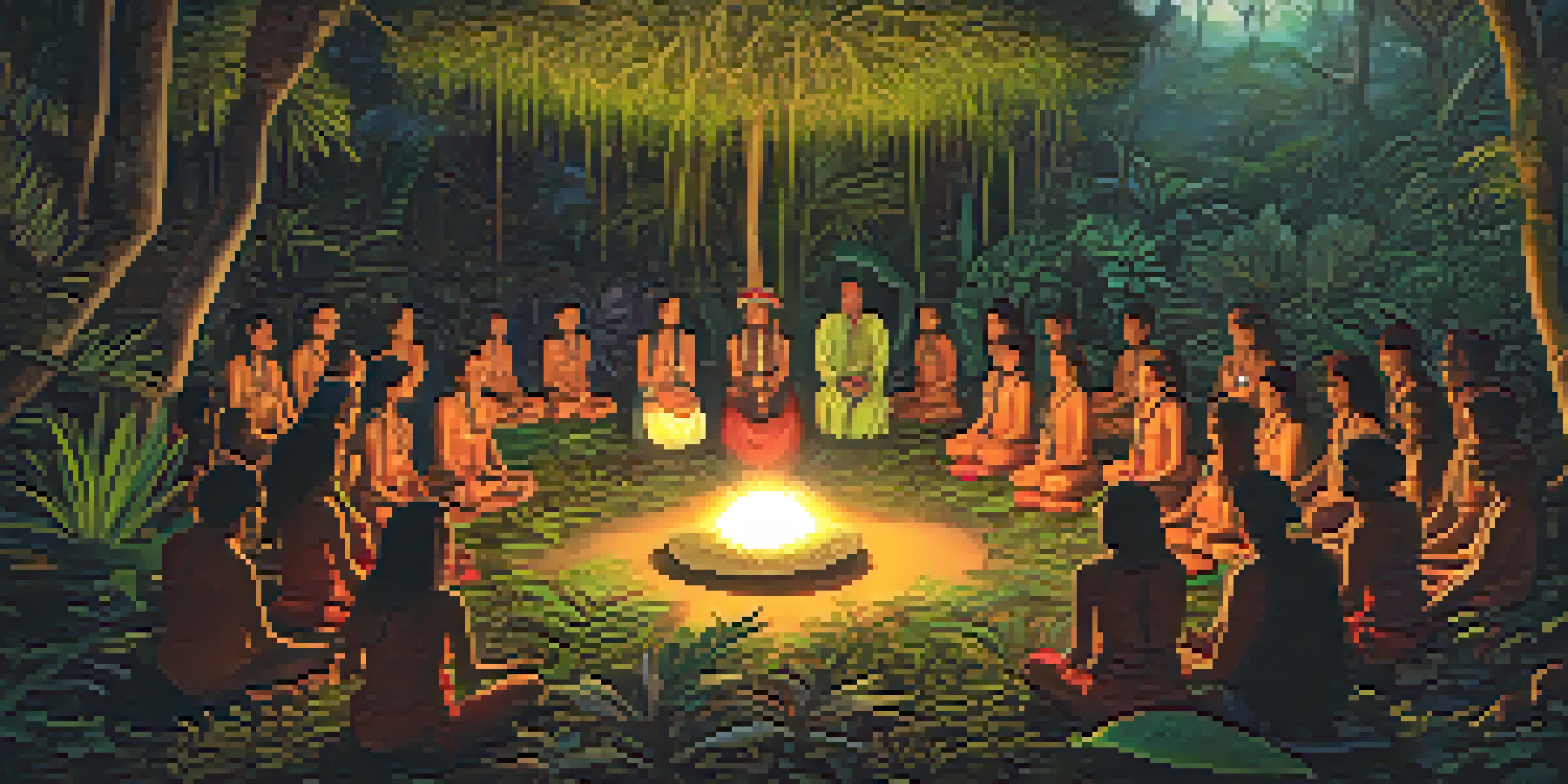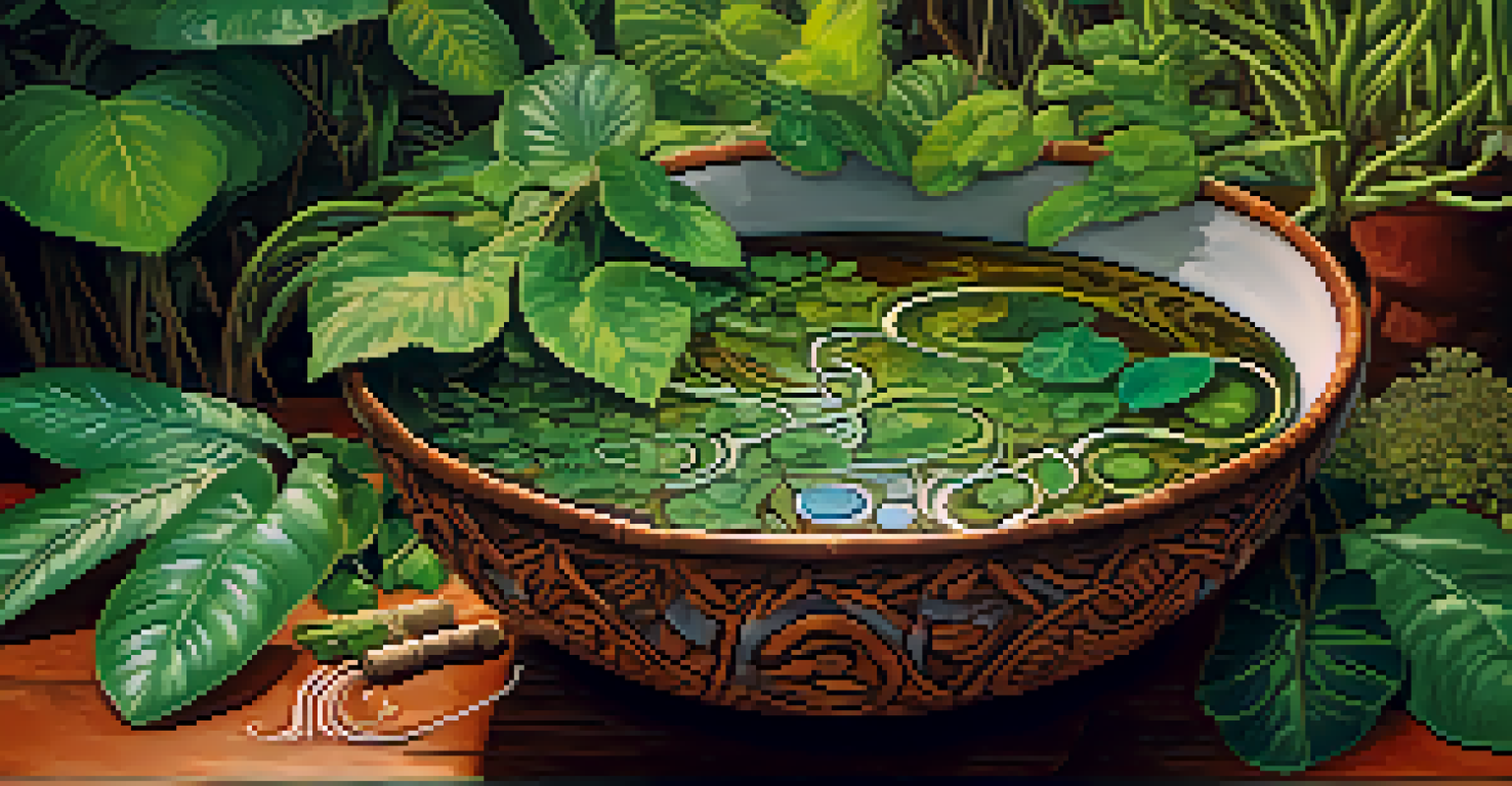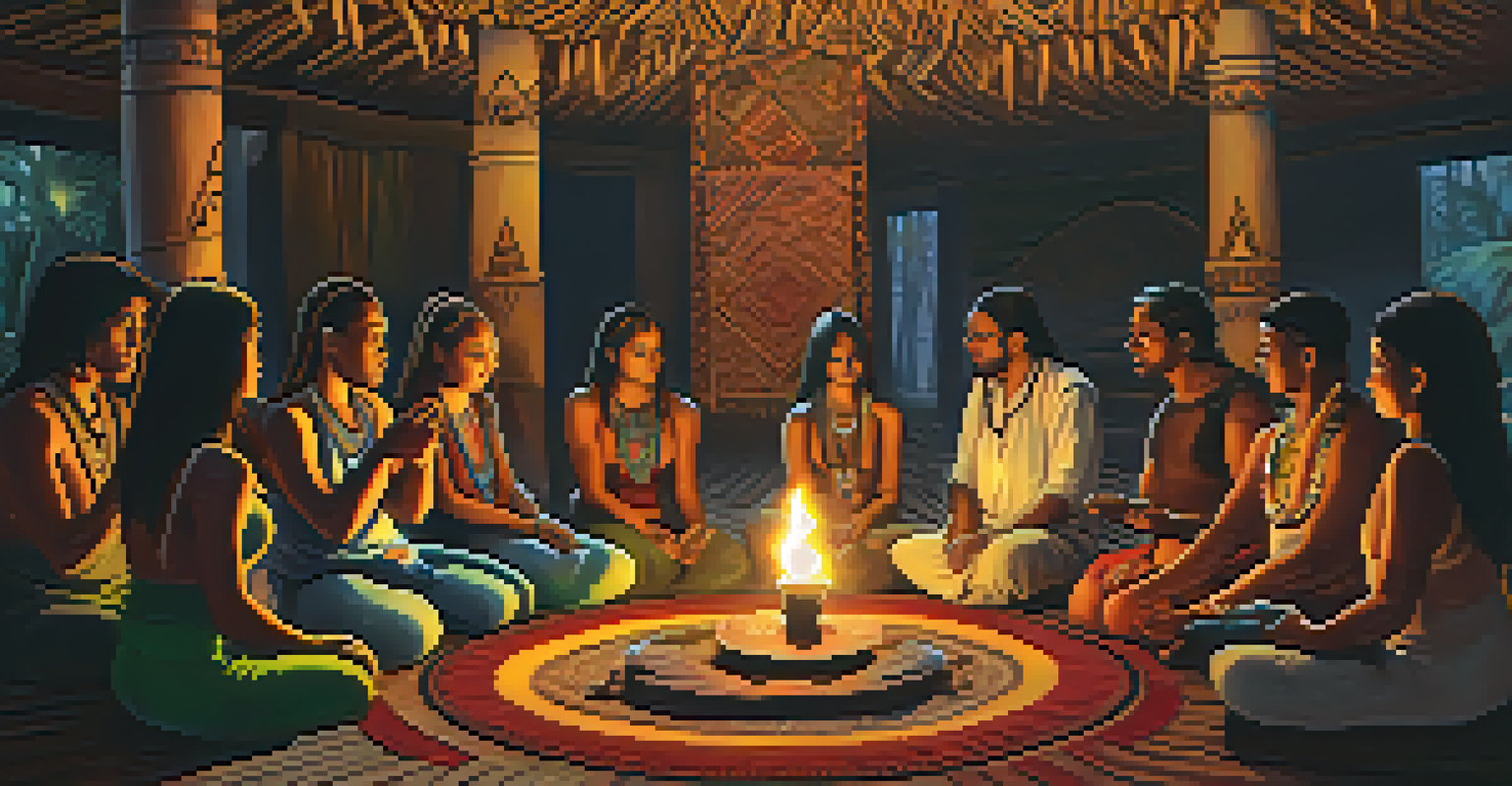Ayahuasca and Its Role in Indigenous Community Healing Practices

Understanding Ayahuasca and Its Origins
Ayahuasca is a powerful plant medicine made from the Banisteriopsis caapi vine and other plants. Traditionally, it has been used by indigenous communities in the Amazon rainforest for centuries. This sacred brew is more than just a drink; it is a spiritual tool that connects users to their inner selves and the natural world.
The experience of Ayahuasca is not just a journey of the mind, but a profound exploration of the self and the universe.
The origins of Ayahuasca trace back to various indigenous tribes, each with its unique rituals and beliefs surrounding its use. These practices often involve a shaman, a spiritual guide who facilitates the experience and provides support during the journey. This deep-rooted cultural significance highlights Ayahuasca's role in community healing beyond mere consumption.
As we delve deeper into Ayahuasca, it's essential to recognize its holistic approach to health. It serves as a bridge between the physical and spiritual realms, addressing emotional, mental, and social well-being. This interconnectedness is a cornerstone of indigenous healing practices, making Ayahuasca a vital component of their cultural identity.
The Role of Shamans in Ayahuasca Ceremonies
Shamans, often referred to as healers or medicine people, play a crucial role in Ayahuasca ceremonies. They are trained in the traditional knowledge and practices passed down through generations, which helps guide participants through their experiences. Their expertise is essential in creating a safe and supportive environment for healing.

During a ceremony, shamans invoke spiritual entities and utilize songs known as icaros to enhance the experience. These songs, filled with intention and meaning, help participants navigate their journeys and facilitate emotional release. The shaman's presence is not only comforting but also integral to the transformative process that Ayahuasca offers.
Ayahuasca's Cultural Roots
Ayahuasca is a sacred brew with deep cultural significance among indigenous communities, serving as a tool for spiritual connection and community healing.
Moreover, shamans often perform additional healing rituals before and after the Ayahuasca experience. These may include cleansing ceremonies or the use of other medicinal plants to ensure a holistic approach to healing. By combining traditional practices with the Ayahuasca experience, shamans provide a comprehensive healing journey.
Ayahuasca's Impact on Mental Health
Many individuals seek Ayahuasca for its potential to address mental health issues such as depression, anxiety, and PTSD. The brew's psychoactive properties can induce profound introspection, allowing participants to confront deep-seated emotions and traumas. This process can lead to significant breakthroughs in understanding and healing.
In the heart of the Amazon, Ayahuasca is more than a brew; it is a bridge between worlds, a path to healing the spirit and the community.
Research suggests that Ayahuasca may promote neuroplasticity, which is the brain's ability to reorganize itself by forming new neural connections. This can be particularly beneficial for those struggling with mental health challenges, as it encourages new patterns of thinking and behavior. The experience can often lead to a greater sense of clarity and emotional release.
However, it's important to approach Ayahuasca with caution and respect, as not every experience is the same. Individuals may encounter difficult emotions or memories during their journey. This unpredictability underscores the importance of having a skilled shaman present to guide and support participants through challenging moments.
Cultural Significance of Ayahuasca in Indigenous Communities
Ayahuasca is deeply embedded in the cultural fabric of many indigenous communities, symbolizing their connection to nature and spirituality. It serves as a communal experience, fostering bonds among participants and reinforcing shared beliefs. The rituals surrounding Ayahuasca emphasize the importance of community in the healing process.
In these cultures, the use of Ayahuasca is not merely for individual healing; it is also a means of preserving ancestral knowledge and traditions. As younger generations partake in these ceremonies, they learn about their heritage and the wisdom of their ancestors. This transmission of knowledge is vital for cultural preservation and continuity.
Shamans Guide Healing Journeys
Shamans play a vital role in Ayahuasca ceremonies, providing guidance and support to participants through traditional knowledge and practices.
Additionally, Ayahuasca has gained international recognition, leading to a growing interest in its healing properties. While this can promote awareness and appreciation for indigenous practices, it also raises concerns about cultural appropriation and the commodification of sacred rituals. Balancing respect for these traditions with modern exploration is an ongoing challenge.
Ayahuasca and Physical Healing Practices
While Ayahuasca is primarily known for its psychological benefits, it also plays a role in physical healing practices within indigenous communities. Shamans often incorporate other medicinal plants and rituals alongside Ayahuasca to address physical ailments. This holistic approach recognizes the interconnectedness of the body, mind, and spirit.
For instance, many shamans utilize cleansing rituals that may involve the use of herbal baths or fasting before the Ayahuasca ceremony. These practices are believed to prepare the body and spirit for the journey ahead, enhancing the overall healing experience. The emphasis on physical preparation highlights the comprehensive nature of indigenous healing.
Moreover, participants often report experiencing physical sensations during their Ayahuasca journeys, which can manifest as purging or emotional release. This physical aspect of healing is viewed as a necessary part of the process, allowing individuals to shed not just emotional burdens but also physical toxins. Such experiences reinforce the idea that healing is a multi-dimensional journey.
Challenges Facing Ayahuasca Practices Today
As Ayahuasca gains popularity beyond indigenous communities, several challenges arise. One significant concern is the potential for cultural appropriation, where non-indigenous individuals participate in ceremonies without understanding their significance. This can lead to a dilution of the practices and disrespect for the traditions that have been safeguarded for generations.
Additionally, the surge in ayahuasca tourism can strain local resources and disrupt traditional practices. Many shamans find themselves overwhelmed by the influx of seekers, which can compromise the quality of the experience. Ensuring that ceremonies are conducted with integrity and respect is essential for maintaining the authenticity of these ancient traditions.
Mental Health Benefits of Ayahuasca
Ayahuasca is sought for its potential to address mental health issues, fostering introspection and emotional healing through its psychoactive properties.
Lastly, there are health risks associated with Ayahuasca that must be acknowledged. Individuals with certain medical conditions or those on specific medications may face serious side effects. It's crucial for participants to approach Ayahuasca with caution and to seek out reputable practitioners who prioritize safety and well-being.
The Future of Ayahuasca in Healing Practices
Looking ahead, the future of Ayahuasca in healing practices will likely continue to evolve as awareness grows. There is potential for greater integration of traditional indigenous wisdom with contemporary therapeutic approaches, which could enhance mental health treatment options. This blending of knowledge can open doors to new understandings of healing.
Moreover, ongoing research into the benefits and risks of Ayahuasca will contribute to a more informed perspective on its use in modern contexts. Scientific studies may help demystify the brew, providing evidence that supports its therapeutic potential while also highlighting the importance of cultural respect.

Ultimately, the future of Ayahuasca will depend on the willingness of both indigenous communities and the wider world to engage in respectful dialogue. By honoring the roots of Ayahuasca and its significance in indigenous healing, we can foster a more equitable relationship and ensure that these sacred practices are preserved for generations to come.